Why You Need To Keep Your Grease Ducts Clean To Ensure Kitchen Safety
When cleaning your home, it can be easy to overlook your kitchen range and ventilation. This is especially true if you have a system with grease ducts — after all, when a mess is out of sight, it's often out of mind. But keeping up with these ducts' maintenance is vital, both for ensuring that your ventilation system works properly and for reducing fire risks.
Every stove has some sort of kitchen exhaust system. Usually, you'll see either ducted or ductless range hoods, although convertible range hoods are also becoming more common. With ductless ranges, you don't have to worry about grease ducts, as they pull dirty air through a filter inside of your range hood before releasing clean air back into your kitchen. On the other hand, ducted ranges rely on a duct in the wall, ceiling, or floor to move dirty air outside of your home. The latter type is ideal for commercial kitchens or homes with large stoves, as they're more efficient than ductless models.
With ducted systems, grease, dust, or even outside debris like pollen can build up inside of your ducts and restrict air flow. If you fail to properly clean your ducts and allow grease to continue building up, you may see multiple effects. First, you'll use more energy to circulate air, as the ventilation system needs to work harder to bypass the grease. You may also find that your kitchen's air quality goes down, as your ventilation system can't work as efficiently. Most importantly, though, dirty ducts pose a huge fire risk because the grease inside them is still easily flammable.
How to maintain your grease ducts
The frequency with which you need to clean your ducts mostly comes down to how often you use them. Generally, you should inspect your ducts at least once a year. But if you do more home cooking than the average person, and especially if you produce a lot of smoke or grease when cooking, you can bump up that frequency to bi-annually or even quarterly.
To check your ducts, you just need to remove your vent cover and use a flashlight to examine them for any debris or damage like cracks and holes. It's also possible to clean your ducts by yourself with a cloth or vacuum cleaner hose. If you can't access your ventilation system, however, or if you notice any damages, then you should bring in professionals to handle it. They can also clean your ducts for you if you find the task too overwhelming.
Along with grease ducts, properly cleaning your range hood also involves checking the filters. Most ducted ranges have mesh filters to catch grease and contaminants before the air goes outside. These filters don't need to be replaced unless they're broken, but they should be cleaned about once a month. To do so, simply soak them in hot water with degreaser or dish soap for about 15 minutes before cleaning them with a sponge. Rinse and allow them to dry overnight before returning them to your range hood.

